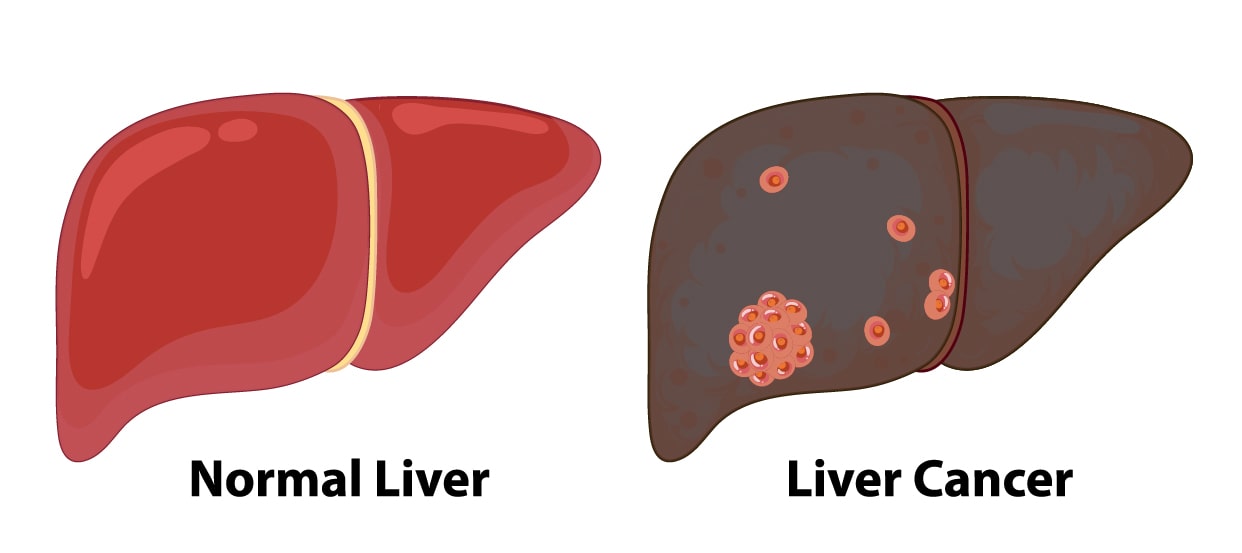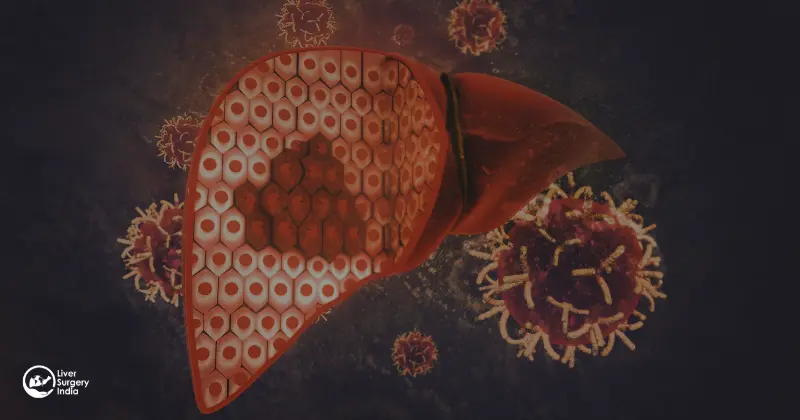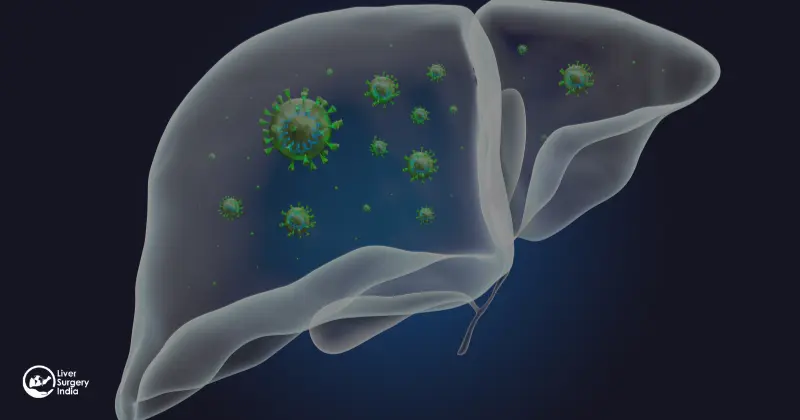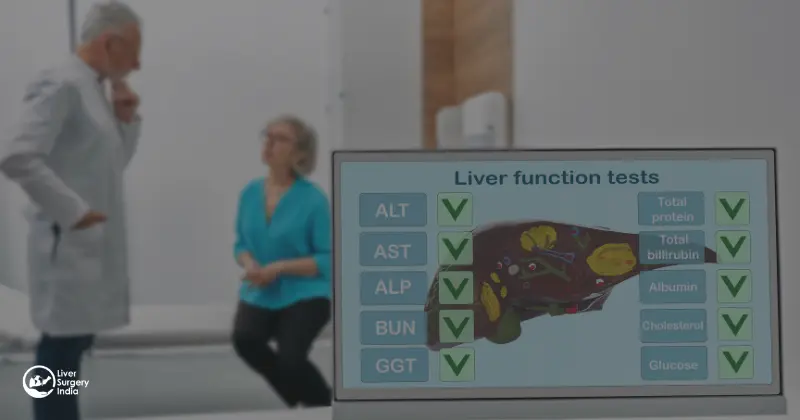
The body's largest solid organ is the liver. It carries out hundreds of essential tasks, including removing toxins from the body's blood supply, regulating blood clotting, and maintaining appropriate blood sugar levels. It is situated beneath the rib cage in the right upper abdomen. Liver cancer is a life-threatening disease and one of the fastest-growing cancer types. There are two types of liver cancer: primary and secondary. Primary cancer starts in your liver whereas secondary cancer spreads to your liver from another part of your body.
Liver cancer is much more common in Southeast Asian countries than in Western countries. In many of these countries, it is the most common type of cancer. Around 800,000 individuals worldwide receive a diagnosis of this illness every year. With over 700,000 deaths from the disease each year, liver cancer is also one of the main causes of cancer-related deaths globally.
The following article explains in detail liver cancer; its signs and symptoms, diagnosis, importance of early detection, and treatment.

It is a major concern among people; Liver cancer is cancer that arises in the cells of your liver. It is a life-threatening condition and one of the fastest-growing cancer types. The liver can be affected by primary liver cancer, which starts in the liver, or by cancer which develops in other parts of the body and then spreads to the liver. The majority of liver cancer is secondary or metastatic, meaning it starts elsewhere in the body.
Several types of cancer can develop in the liver. Hepatocellular carcinoma, which originates in the primary form of liver cell (hepatocyte), is the most common type of liver cancer. There are other less prevalent forms of liver cancer, such as hepatoblastoma and intrahepatic cholangiocarcinoma.
Liver cancer arises from mutations or changes in the DNA of the liver cells. DNA is the genetic code that provides instructions for every single chemical reaction that occurs in your body. DNA mutations cause changes to these directives. One conceivable outcome would be the beginning of uncontrollably growing cells that eventually expand into a mass of malignant cells called a tumor. Although the exact source of these alterations is unknown, cancer may develop from a chronic hepatitis infection. Liver cancer, however, can also affect healthy people for whom there is no known cause.
In the early stages of primary liver cancer, the majority of people don't exhibit any early symptoms or signs. The following are the signs and symptoms resulting from primary liver cancer or other conditions. Consult your medical professional if you notice any of the following symptoms;

If your physical examination reveals liver cancer signs and symptoms, your healthcare professional may suspect liver cancer in you. To find out more, they might ask for the following tests:

Blood tests: Blood tests for cancer, such as liver function tests, can be performed by medical professionals to determine liver enzymes, proteins, and other chemicals that indicate the health or damage of your liver. They could run an alpha-fetoprotein (AFP) test. Elevated AFP levels could be a sign of liver cancer.
Ultrasound scans: This helps healthcare professionals to visualize the soft tissue structures and to check for tumors.
Computed tomography (CT) scan: This special kind of X-ray produces detailed images of your liver, providing information about liver tumor size and location.
Magnetic resonance imaging (MRI): The procedure uses radio waves, a big magnet, and a computer to create extremely clear images of your body.
Angiogram: This test helps medical professionals in examining the blood arteries in your liver. Your healthcare provider will inject dye into an artery during this procedure to monitor blood vessel activity and check for obstructions.
Biopsy: Medical professionals take tissue from the liver to check for cancerous growths. The most reliable method of verifying a liver cancer diagnosis is through biopsies.
Endoscopic retrograde cholangiopancreatography (ERCP): This procedure examines your bile ducts using an endoscope and a catheter, which are thin, flexible tubes.
Percutaneous transhepatic cholangiography (PTC): Similar to an ERCP, a percutaneous transhepatic cholangiography (PTC) produces X-rays of your bile ducts. Your healthcare professional delivers contrast dye by directly placing a needle into your liver and bile ducts, as opposed to using an endoscope and catheter. Usually, a PTC is reserved for those who are unable to have an ERCP.
For the purpose of treatment and to increase the patient's chance of survival, liver cancer screening is essential for early disease detection. Early detection and therapy can be initiated more successfully since most treatments don't always need to be severe and can be implemented sooner in the course of liver cancer development. In order to improve the prognosis, people should pay attention to screening and control of risk factors as they may play a key role in the early detection of liver cancer before it advances. This ensures that the rates of discovery are high and hence improves the possibility of the medical condition being treated before it gets to this stage, which saves lives.
It becomes paramount to know the necessity of early detection of liver cancer in order to address the menace posed by this deadly disease. Liver cancer is on the rise and is among the most rampant cancers as per cancer statistics or cancer facts; therefore, an early liver cancer diagnosis is a confirmation of hope for proper liver cancer treatment and subsequent enhanced quality of life.
The knowledge of signs and symptoms, screening, and risk factors helps people to act appropriately and see the need to seek medical help in order to go through early diagnosis hence facilitating prompt management through the necessary management therapies or procedures. By providing ways to educate people, increase awareness, and encourage those at risk to seek screening and diagnostic exams, it may be possible to reduce the number of cases of liver cancer, and in turn, save more lives.
Treatment for liver cancer includes a variety of standard procedures, such as partial hepatectomy, liver transplant, and liver-directed therapies like hepatic artery embolisation and ablation. A variety of chemotherapy techniques, chemoembolization, radiation therapy, radioembolization, immunotherapy, and targeted therapy may also be used.
Consult Dr. Abhishek Yadav, one of Pune's leading hepatologists, if you are experiencing signs of liver cancer or suspect that you may have cancer. He can offer you individualized care and the best course of treatment for your liver cancer. Book your appointment now!
Q: Is it possible to cure liver cancer?
A: It is hard to cure any type of liver cancer. It is unusual to discover primary liver cancer early on when it is most susceptible to treatment. Since secondary or metastatic liver cancer has already spread, treatment might be challenging. Surgery is challenging because of the liver's complex web of bile ducts and blood arteries.
Q: How to Detect Liver Cancer Early?
A: CT scanning and MRI scanning help healthcare professionals in the early detection of liver cancer.